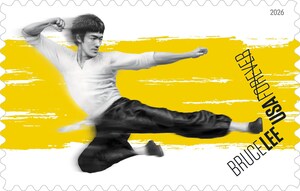"Born in 1924 in Plains, Georgia — a town of just 600 people — Jimmy Carter's story is one of humble beginnings leading to a lifetime of extraordinary service," said Thomas J. Marshall, general counsel and executive vice president of the U.S. Postal Service. "During his presidency from 1977 to 1981, he confronted many challenges and achieved many milestones. But perhaps the most remarkable chapter began after he left the White House. Rather than retreating to a comfortable retirement, he and his wife, Rosalynn, embarked on what many consider the most consequential post-presidency in American history."
Jason Carter, chair of The Carter Center, said, "Our family is excited to attend the first-day-of-issue ceremony to celebrate the life and legacy of my grandfather, President Jimmy Carter. My grandparents would be touched by this incredible honor."
Beth Davis, The Carter Center's chief operating officer, said the Postal Service played a central role in President Carter's life.
"Postcards from his uncle inspired a young Jimmy Carter to join the Navy and explore the world outside of rural Georgia. Missives from his mother during her time in India with the Peace Corps after she retired from nursing set the example for him that a life of purpose doesn't end in your 50s when one career path concludes. The culmination of this inspiration led to President Carter's idea for The Carter Center, where he spent more than 40 years, together with Mrs. Carter, waging peace, fighting disease and building hope worldwide," said Davis, who is also the director of scheduling for the Office of Jimmy Carter.
From his origins in small-town Georgia, Carter came to the White House as an outsider who represented a new generation of progressive Southern politicians.
He was inaugurated as the 39th president on Jan. 20, 1977. During his term, he would make humility and reconciliation recurring themes in his presidency.
Carter made a mark with his appointments of many women and minorities to government positions. He created a presidential commission on mental health, established new cabinet departments, and greatly increased the size of the National Park System and federally designated wilderness areas. Mindful of the nation's fiscal position, he was deeply concerned with trying to balance the federal budget and control inflation. In his efforts to improve the economy, he ushered through deregulation in several industries, including energy and air travel.
On the world stage, he was praised for personally negotiating the Camp David Accords, providing a framework for peace in the Middle East. He signed SALT II, a treaty with the Soviet Union to limit strategic nuclear arms, and he initiated a major change in foreign policy when he announced that the United States would officially recognize and establish formal diplomatic relations with the People's Republic of China.
After leaving the presidency, Carter became a prominent activist for peace, human rights and social and economic progress around the world. In 1982, he partnered with Emory University to establish The Carter Center, which advances democracy and human rights, resolves conflicts and works to improve health in some of the world's poorest nations. In recognition of his efforts, he received the Nobel Peace Prize in 2002 — cementing his reputation as one of the most active and admired former presidents.
The stamp art is a 1982 oil-on-linen painting created as a life study by artist Herbert E. Abrams (1921-2003) in preparation for painting Carter's official White House portrait. Ethel Kessler, an art director for USPS, designed the stamp.
As a Forever stamp, the Jimmy Carter stamp will always be equal in value to the current First-Class Mail 1-ounce price. News of the stamp is being shared with the hashtag #JimmyCarterStamp.
Postal Products
Customers may purchase stamps and other philatelic products through the Postal Store at usps.com/shopstamps, by calling 844-737-7826, by mail through USA Philatelic or at Post Office locations nationwide. For officially licensed stamp products, shop the USPS Officially Licensed Collection on Amazon. Additional information on stamps, First Day of Issue Ceremonies and stamp inspired products can be found at StampsForever.com.
Please Note: The United States Postal Service is an independent federal establishment, mandated to be self-financing and to serve every American community through the affordable, reliable and secure delivery of mail and packages to nearly 169 million addresses six and often seven days a week. Overseen by a bipartisan Board of Governors, the Postal Service is implementing a 10-year transformation plan, Delivering for America, to modernize the postal network, restore long-term financial sustainability, dramatically improve service across all mail and shipping categories, and maintain the organization as one of America's most valued and trusted brands.
The Postal Service generally receives no tax dollars for operating expenses and relies on the sale of postage, products and services to fund its operations.
For USPS media resources, including broadcast-quality video and audio and photo stills, visit the USPS Newsroom. Follow us on X, formerly known as Twitter;Facebook; Instagram; Pinterest; Threads; and LinkedIn. Subscribe to the USPS YouTube Channel. For more information about the Postal Service, visit usps.com and Postal Facts.
National contact: James McKean
[email protected]
usps.com/news
Local contact: Tiffany Rowland
[email protected]
usps.com/news
SOURCE U.S. Postal Service










Share this article